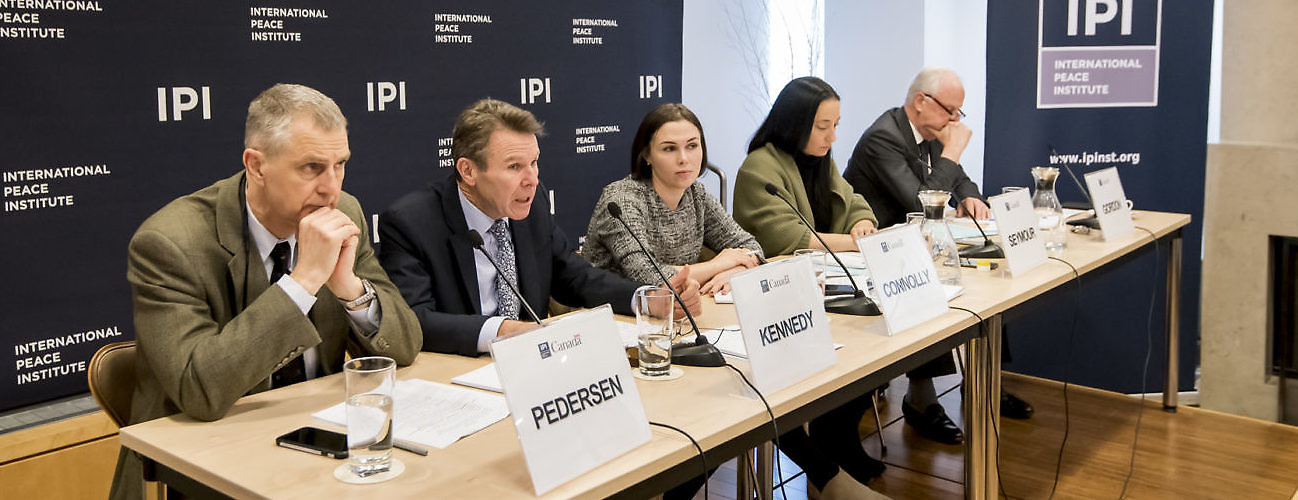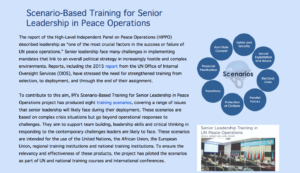“Organizations’ mandates thrive or fail on the basis of the quality of leadership,” said Fabrizio Hochschild, Assistant United Nations Secretary-General for Strategic Coordination. “The allocation of resources are things we have very little control of, but one thing we do have control over is how we select, empower, and support our leaders…it’s worth every possible investment.”
How the UN recruits, prepares, trains and assesses its senior leaders for UN peace operations was the subject of a February 25th policy forum, cosponsored by IPI and Government of Canada, on “Training for Senior Leaders in Field Operations: Gaps, Challenges and Techniques for Improvement” where IPI launched its recently released eight training scenarios, in English and French, contributing to better preparing senior leaders for deployment. These scenarios are based on complex crisis situations but go beyond operational responses to challenges. They aim to support team building, leadership skills and critical thinking in responding to the contemporary challenges leaders are likely to face.
While good leadership is more important than ever, Mr. Hochschild said, choosing and training senior leaders has become more difficult than ever before. “They’re not expected just to be the leader of their particular section, their particular sector, their particular expertise group, but they are meant to see across the system and pursue solutions across the system because that’s what the problems demand. There are very few problems out there that the UN confronts that can be treated in a siloed way, as ‘pure peacekeeping problems’ or ‘pure human rights problems’ or ‘pure development problems,’ they’re a combination of all, so our leaders also need to think across systems and across mandates.”
Kevin S. Kennedy, a retired principal from the UN Department of Peacekeeping Operations and lead author of the IPI paper Senior Leadership Training in UN Peace Operations, stressed that “the words leadership, accountability, integration appear in almost every discussion of peacekeeping. Our report has highlighted that where missions suffer setbacks and failures in recent years, lack of cross component integration and weaknesses in leadership teams have almost always been identified as significant contributing factors.”
A means of overcoming these challenges is, as Mark Pedersen, Chief, Integrated Training Services Department of Peace Operations (DPO), raised- the use of scenarios based training. “They allow teams to practice their skills in a controlled environment. The focus is on getting the process right, rather than getting the right answer. If you can get the process right and practice the process, you have a resilient way of tackling problems that you can replicate when the time comes to focus and to address operational challenges.”
However, Maj. Gen Robert Gordon, CMG CBE (ret) and Senior Mentor at the Senior Mission Leadership training program, reminded us that “training is still a controversial word” around the UN. He said that he had recently conducted with a retired UN officer a survey of UN senior leaders. “What was very stark from the countless field interviews we undertook was the difference between those senior leaders, both civilian and in uniform, who had some form of dedicated preparation for UN missions…and those that had not.”
General Gordon contrasted the preparation level of national armies versus the UN, highlighting that there was too little regard at the UN for marrying skills with the specific needs of UN operations. “In my recent review,” Gen. Gordon said, “I came across plenty of good leaders as recognized by their member states, but nevertheless they were people struggling in the UN environment through insufficient preparation and support.”
A central theme of the panel was the fact that training at the UN in general suffered from a lack of resources, which curtails proper capacity building, he said. “The Secretariat continues to scramble for voluntary and ad hoc funding for senior leadership training.” There is a need to move beyond rhetoric to long-term, sustained financial support for the recruitment, preparation, training and assessment of senior leaders. Without this, training will always be considered an afterthought.
Gabriella Seymour, Chief, Leadership Support Section, Office of the Director for Coordination and Shared Services, UN, said that her office had come a long way in recruiting the right people for the right jobs over the past 20 years but still encountered gaps that would persist as long as training wasn’t sufficiently prioritized. “Our progress is precarious and will remain so while the importance of getting the leadership right and investing in supporting it continues to take a backseat to the more tangible and practical challenges of peacekeeping today. Expedience, the immediacy of the challenges on the ground, often over ambitious mandates, and impossible deadlines sometimes trump the best efforts to provide comprehensive pre-deployment briefings and training.”
Mr. Hochschild said that Secretary- General Antonio Guterres wanted thinking on what characterizes good leadership to concentrate on the impact it has. “What difference is our leadership making, not in terms of respect we may or may not be getting with our supervisors, not in terms of whether we are pleasing or displeasing our member states, not only in terms of how motivated our staff are, although that is critical, but frankly what difference are we making for those for whom we are a necessity and a hope. What difference are we making in the lives of those whom we are here to serve?” he asked. “That is the ultimate test of the success of our leadership, and something we have to keep coming back to.”
Brig. Gen. Martin Girard, Military Advisor to the Permanent Mission of Canada to the UN, made welcoming remarks, and IPI Senior Policy Analyst Lesley Connolly moderated the discussion.









